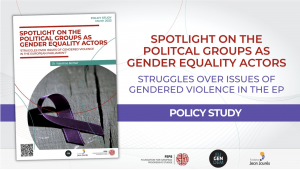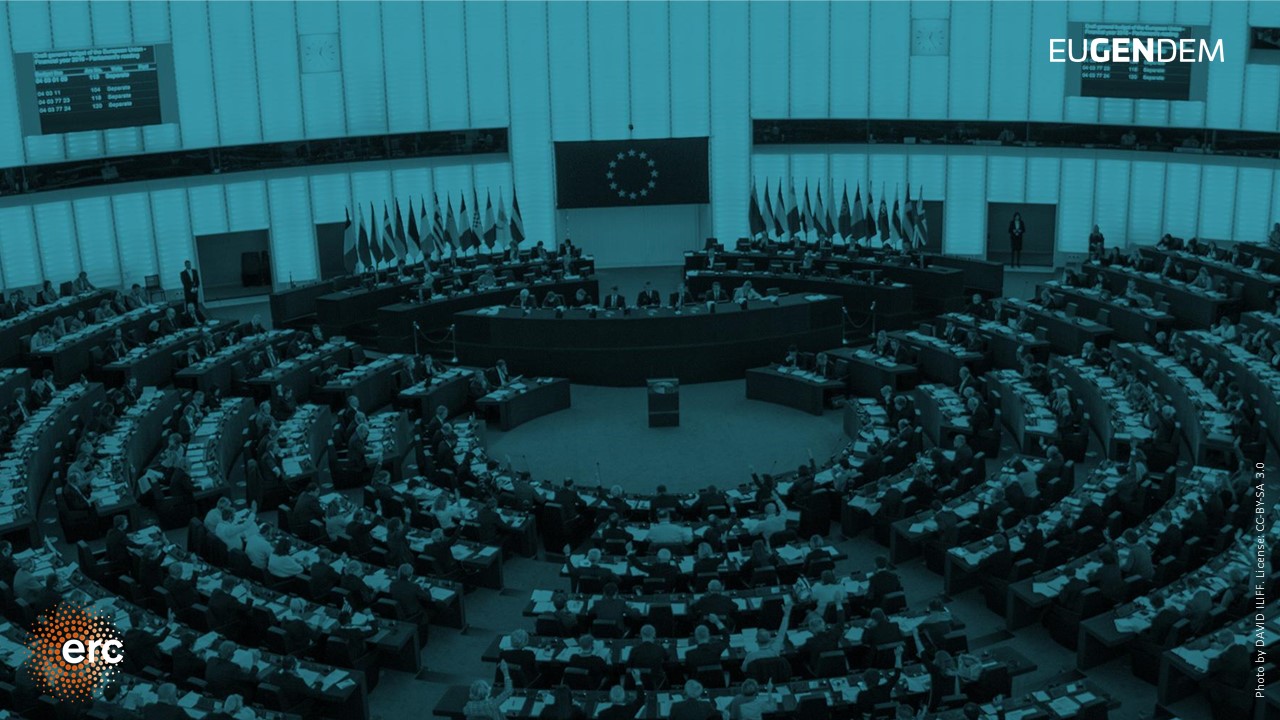

EUGenDem postdoctoral researcher Dr. Valentine Berthet recently published a Policy Study translating the findings of her doctoral dissertation into policy recommendations. This work was done in collaboration with the Foundation for European Progressive Studies and the Fondation Jean Jaurès.
The aim of this policy study is to provide an account on the most advanced and recent developments of policies about gendered violence in the European Parliament (EP). Today’s context is shaped by the backlash of anti-gender movements and the rise of right-wing populist actors in the EU and the EP, affecting the legitimacy of these institutions altogether. As a result, gender equality is now a highly contested policy field in the EP, and it matters to understand the reasons for these contestations and to develop better strategies to tackle the backlash. This policy study offers an extensive overview of the latest policy developments related to gendered violence, not only in terms of policy outcomes but also in terms of how gender equality as a norm is debated. It focuses on the EU’s ratification of the Istanbul Convention, the development of a supranational right to abortion in the EU and sexual harassment issues within the EP. Taken together, they showcase the necessity to prioritise the field in decision-making but also the importance of remaining attentive to both everyday practices in the Parliament and to dynamics within and between its political groups in relation to gender equality issues.
Analysing discourses around these three issues shows the forms of resistance and stresses the counterstrategies needed to advance gender equality objectives. The effort of analysing the ins and outs of different discourses is important to better understand what is at stake when gender equality advances, stagnates or declines in Europe. Via discourses, political actors attribute meanings and solutions to social problems – in other words, they set their political agendas. Thus, politics is the exercise of defining and defending one’s own account in discursive battles with political opponents. Against this background, it is possible to assess the knowledge produced by political actors and expose their contradictions, nuances, and silences vis-à-vis an issue. In relation to gender equality, the analysis of discourses shed lights on the processes that either maintain, challenge, or transform all sorts of inequalities.
The Policy Study shows that the EP is still not supporting gender equality unanimously. Rather, it is composed of different political groups that hold different political views on if and how gender equality should be achieved in the EU. The groups are themselves heterogeneous as they present internal contradictions, mostly between different national party delegations. While the European Parliament projects itself as a defender of equality norms, it must remain attentive to its own unequal institutional practices (e.g., in relation to gender equality and anti-racism) and must tackle the oppositions to equality measures, including subtle ones. Eventually, the achievement of gender equality in the European Parliament and its political groups requires coordinated efforts, which include decision-making strategies and a review of their own internal measures.
Key recommendations include:
- Adopting both the ratification of the Istanbul Convention and the 2022 Directive proposal on violence against women and domestic violence as the two texts complement each other.
- Adopting measures safeguarding abortion rights in the EU are part of the EP’s democratic role. Even if non-binding, their symbolic role is important as they set broad guiding principles and are then referred to as grounds for future binding and non-binding policies.
- The European Parliament and its political groups must establish a comprehensive legal framework with a clear message that violence is unacceptable and that provides adequate support on how to report such violence. Active and informed leadership is key to combat a culture of impunity and foster a good and healthy working environment.
- Tackling the opposition to gender equality in policymaking requires a coordinated effort, such as fostering formal alliances across political groups and committees. Political groups are encouraged to self-identify and self-assess which forms of opposition prevail internally and to develop formal measures that work accordingly.
- Finally, equality must be upheld as a non-negotiable democratic value in the EU wherever possible, even if only in debates and non-binding measures because they create an environment in which gender equality is protected.
For the English version see this link
For the French version see this link




